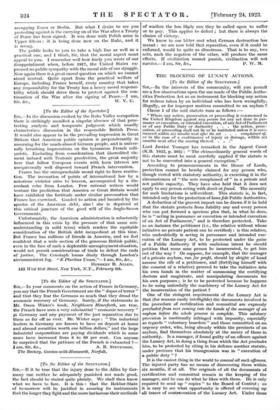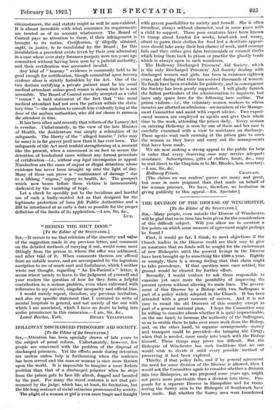THE BLOCKING OF LUNACY ACTIONS.
[To the Editor. of the SPECTATOR.]
Sin,—In the interests of the community, will you permit me a few observations upon the use made of the Public Autho- rities Protection Act as an instrument for blocking any action for redress taken by an individual who has been wrongfully, illegally, or for improper motives committed to an asylum ?
Clause 1 of the said statute runs as follows
Where any action, prosecution or proceeding is commenced in the United Kingdom against any person for any act done in pur- suance or execution, or intended execution, of any Act of Parliament or of any Public Duty or Authority . . . the action, prose- cution, or proceeding shall not lie or be instituted unless it is com- menced within six months next after the act . . . complained of, or in the case of a continuance of injury or damage, within six months next after the ceasing thereof. . . ."
Lord Justice Younger has remarked in the Appeal Court (K.B. 1922, p. 305) : " The ektraordinarily general words of this statute must be most carefully applied if the statute is not to be converted into a general exemption." According to pronouncements in the House of Lords, protection cannot be hereby claimed for any person who,
though vested with statutory authority, is exercising it in the circumstances of " the acts complained of ". in a private and not public capacity. They have also held that it does not apply to any person acting with deceit or fraud. The necessity for such limitations is self-evident. This statute is, in fact, intended only for the protection of bona fide Public Authorities.
A deduction of the gravest import can be drawn if it be held that the statute protects from liability any and every person who can put forward a specious plea that, in what he does, he is " acting in pursuance or execution or intended execution of an Act of Parliament," and is therefore protected. Take
as an instance the petitioner (i.e., the relative without whose initiative no private patient can be certified) : is this relative, who undoubtedly is acting in pursuance and intended exe-
cution of the Lunacy Act, to be protected under the guise
of a Public Authority if with malicious intent he should petition that some sane person be incarcerated, to get him out of the way ? Or suppose, for example, that the manager of a private asylum, run for profit, should by sleight of hand assume the role of a petitioner, and (fortifying himself with the consent of a relative) proceed to take the initiative into his own hands in the matter of summoning the certifying doctors and magistrate, and manipulating documents for his own purposes ; is he to be protected because he happens to be using unlawfully the machinery of the Lunacy Act for
the incarceration of the patient ?
One of the stringent requirements of the Lunacy Act is that (for reasons easily intelligible) the documents involved in the procedure of certification and committal are expressly precluded from ever coming into the hands of the manager of an asylum before the whole process is complete. This salutary
provision is continually infringed with impunity, especially as regards " voluntary boarders " and those committed on an
urgency order, who, being already within the precincts of an asylum, find themselves absolutely at the mercy of those in authority. Is a manager, if found guilty of an offence against the Lunacy Act, in doing a thing from which the Act precludes him, to be protected by citing in his defence another statute, under pretence that his transgression was in " execution of a public duty " ?
It is the easiest thing in the world to conceal all such offences. The injured party has no means of discovering them within six months, if at all. The originals of all the documents of
certification and committal remain in the keeping of the manager, and he can dO what he likes with them. He is only
required to send up " copies " to the Board of Control ; so it is easy. to see what opportunity is offered of. covering up
all traces of contravention of the Lunacy Act. Under these circumstances, the said statute might as well be non-existent. It is almost incredible with what assurance its requirements are treated as of no account whatsoever. The Board of Control pays no attention to them, if their infringement is brought to its notice. Certification, if illegally obtained, ought, in justice, to be invalidated by the Board ; for this invalidation a precedent exists (even by their own admission) in a case where over sixty Swansea paupers were ten years ago committed without having been seen by a judicial authority, and their certification was accounted invalid.
Any kind of " hearsay " evidence is commonly held to be good enough for certification, though committal upon hearsay evidence alone is strictly forbidden by the Act. One of the two doctors certifying a private patient must be his usual medical attendant unless good reason is shown that he is not accessible. The Board of Control recently accepted as a valid " reason " a bald statement of the fact that " the usual medical attendant had not seen the patient within the statu- tory time "—the omission to consult him evidently lying at the door of the asylum authorities, who did not choose to summon the attendant in time.
It has been often said recently that reform of the Lunacy Act is overdue. Unfortunately, in the view of the late Minister of Health, the desideratum was simply a relaxation of its safeguards. The liberty of the " alleged lunatic " (who may be sane) is in far graver peril now than it has ever been. The safeguards of the Act need tenfold strengthening at a moment like the present, when a movement is on foot to secure the detention of borderland cases without any formal procedure of certification—i.e., without any legal investigation or appeal. Numberless are the cases of unjust or illegal detention whose existence has never been brought up into the light of day. Many of these can prove a " continuance of damage " due to a lifelong " stigma," injury to health, &c. The prospect which now looms befoie these victims is immeasurably darkened by the vanishing of hope.
Let a check be speedily put to the invidious and hurtful use of such a badly-worded Act as that designed for the legitimate protection of bona fide Public Authorities and a Bill be introduced at as early a date as possible for the proper definition of the limits of its application.—I am, Sir, &c., Lux.











































 Previous page
Previous page